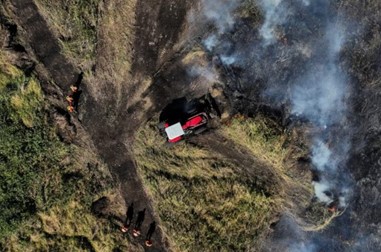
Climate Change Fuels Record Early Fires in Brazil's Wetlands, Study Finds
Climate change has intensified the conditions fueling devastating wildfires in Brazil's Pantanal wetlands by 40%, likely resulting in the deaths of millions of animals this year, according to a study published on Thursday. The research, conducted by World Weather Attribution, a global team of scientists examining the impact of climate change on extreme weather, found that this year's hot, dry, and windy conditions were four to five times more likely due to climate change.
The Pantanal, the world's largest wetland, is renowned for its abundant water resources and unique location—situated between the Amazon rainforest, Brazil's vast savanna, and Paraguay's dry forests. This makes it a haven for rare wildlife and a popular destination for ecotourism.
Typically, wildfires in the Pantanal begin to intensify in July, reaching their peak between August and September. However, this year the fires started unusually early, surging in late May at a pace that scientists warn could surpass the record fires of 2020.
"This year's Pantanal wildfires have the potential to become the worst ever. Even hotter conditions are expected in the coming months," said Filippe Santos, one of the study's authors and a researcher at Portugal's University of Évora and the Federal University of Rio de Janeiro (UFRJ).
In 2020, wildfires ravaged a third of the Pantanal, leading to the deaths of 17 million vertebrates. Before climate change, early fire weather conditions like those seen this year were extremely rare. Now, such conditions are expected approximately every 35 years, according to the study.
UFRJ data indicates that the fires are rapidly expanding again in the Pantanal. As of Thursday, nearly 10% of the Pantanal—an area larger than the U.S. state of Connecticut—has burned this year, the highest amount ever recorded for this period.
The central-western region of Brazil, where the Pantanal is located, is home to thousands of animal and plant species, including jaguars, giant river otters, maned wolves, howler monkeys, and marsh deer. As climate change continues to warm the planet, the Pantanal is expected to become even hotter and drier over time.
While climate change exacerbates the wildfires, human activities often ignite them. Farmers clearing land may set fires or leave behind downed vegetation that easily catches fire, contributing to the spread of the flames.